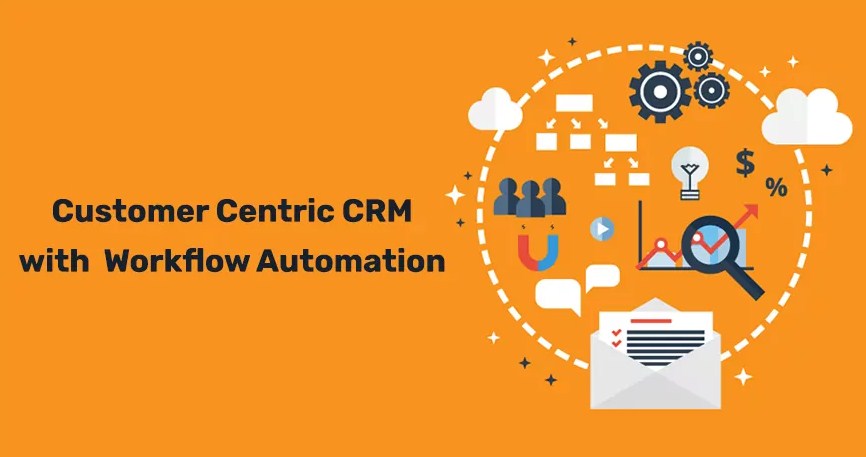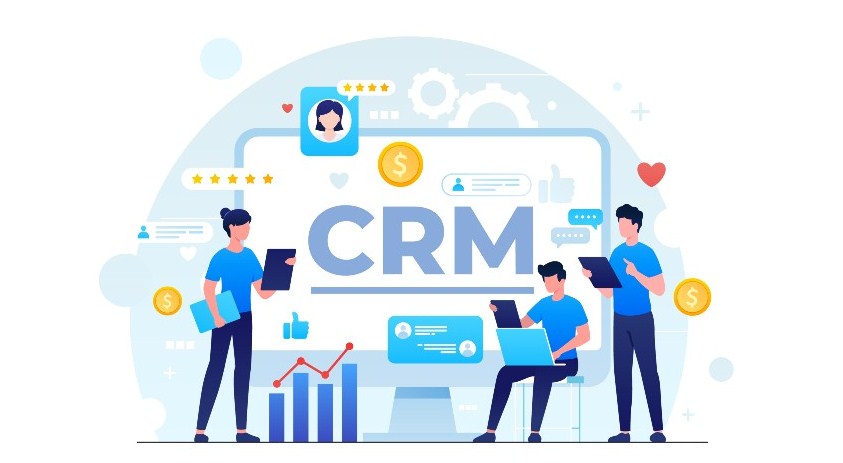Customer-Centric CRM – In today’s business landscape, understanding and prioritizing the needs of your customers has become crucial to gaining a competitive edge. A Customer-Centric CRM (Customer Relationship Management) system is a game-changer for businesses aiming to build strong, long-lasting customer relationships. Whether you’re a small business owner or part of a large enterprise, leveraging CRM software designed around your customers’ needs can vastly improve your customer retention, sales, and overall business efficiency.

In this article, we’ll explore the concept of a Customer-Centric CRM, its benefits, how to choose the right software, and real-world examples of top CRM tools. We’ll also guide you through how to purchase and implement the right CRM system for your business, ensuring that you deliver a seamless, personalized customer experience.
What is Customer-Centric CRM?
A Customer-Centric CRM refers to a type of CRM system that focuses on fostering deeper, more personalized relationships with customers by putting their needs, preferences, and behaviors at the forefront. Unlike traditional CRM systems that primarily focus on internal processes like sales tracking and reporting, a customer-centric CRM emphasizes understanding the customer journey, improving customer service, and ultimately driving customer satisfaction.
Key features of customer-centric CRM systems include:
- Personalized Interactions: Tailor your communication based on customer data.
- Customer Feedback Loops: Collect and analyze feedback to better serve customers.
- Omni-channel Support: Engage customers across different touchpoints, from email to social media.
- Data-driven Insights: Leverage customer behavior and trends to predict needs and actions.
The Benefits of Customer-Centric CRM
1. Improved Customer Retention & Loyalty
A customer-centric approach helps businesses build deeper connections with their clients, fostering loyalty and increasing retention rates. By understanding customer preferences, providing personalized services, and addressing issues promptly, companies create long-term relationships that turn first-time buyers into repeat customers.
2. Enhanced Customer Experience
The more personalized the experience, the more likely your customers are to engage with your business. Customer-centric CRM systems allow businesses to tailor their communication and product recommendations, improving customer satisfaction and delivering a seamless experience.
3. Increased Sales & Revenue
When businesses understand their customers’ needs better, they can cross-sell and upsell products more effectively. Customer-centric CRMs use predictive analytics and data-driven insights to recommend relevant products to customers, boosting sales and revenue.
4. Streamlined Communication
With CRM tools that focus on the customer, your team can easily collaborate, communicate, and share information. This leads to faster response times, better service, and an overall smoother process.
5. Data-Driven Decisions
Customer-centric CRMs help businesses make data-driven decisions by providing comprehensive insights into customer behaviors, sales trends, and service requests. This information can be used to adjust marketing strategies, product offerings, and customer service practices.
Top CRM Tools for Customer-Centric Businesses
To implement a customer-centric CRM strategy effectively, you need the right tools. Here are five of the best CRM systems designed to help businesses manage customer relationships effectively:

1. HubSpot CRM
HubSpot CRM
- Use Case: Ideal for small to medium-sized businesses looking to centralize customer data and improve sales processes.
- Features:
- Free to start
- Marketing automation
- Email tracking & notifications
- Lead management
- Reporting & analytics
- Pros:
- Free plan available
- Easy to use with a user-friendly interface
- Integrates seamlessly with other HubSpot tools
- Cons:
- Can become expensive as you scale up
- Limited customization options in the free version
- Price: Free plan available, paid plans start from $45/month
- Where to Buy: HubSpot CRM Website
2. Salesforce CRM
Salesforce
- Use Case: Perfect for large enterprises requiring customizable CRM features and scalability.
- Features:
- Customizable dashboards
- Advanced analytics
- AI-driven insights
- Multi-channel support
- Integration with thousands of apps
- Pros:
- Robust features for complex needs
- Highly customizable
- Strong ecosystem with numerous integrations
- Cons:
- Expensive for small businesses
- Steep learning curve
- Price: Starting at $25/month per user
- Where to Buy: Salesforce CRM Website
3. Zoho CRM
Zoho CRM
- Use Case: Great for growing businesses seeking an affordable yet feature-rich CRM.
- Features:
- Sales automation
- Multi-channel support (email, phone, social media)
- AI-powered sales assistant
- Custom workflows
- Pros:
- Cost-effective for small businesses
- Excellent automation features
- Customizable interface
- Cons:
- Limited reporting options in the basic plan
- Can become complex with advanced features
- Price: Starts at $12/month per user
- Where to Buy: Zoho CRM Website
4. Pipedrive CRM
Pipedrive CRM
- Use Case: Best for sales teams focused on pipeline management and sales performance tracking.
- Features:
- Visual sales pipeline
- Email integration
- Sales forecasting
- Activity reminders
- Pros:
- Easy-to-use interface
- Focused on sales performance
- Strong automation tools
- Cons:
- Limited features for marketing
- Less customization compared to others
- Price: Starting at $12.50/month per user
- Where to Buy: Pipedrive CRM Website
5. Freshsales CRM
Freshsales CRM
- Use Case: Excellent for teams looking for an all-in-one CRM solution that integrates well with other Freshworks tools.
- Features:
- AI-powered insights
- Lead scoring
- Workflow automation
- Multi-channel communication (email, chat, calls)
- Pros:
- Affordable pricing plans
- Easy integration with other Freshworks products
- Intuitive UI
- Cons:
- Limited third-party integrations
- Basic reporting features
- Price: Starts at $15/month per user
- Where to Buy: Freshsales CRM Website
Comparison Table: CRM Tools Overview
| Feature | HubSpot CRM | Salesforce CRM | Zoho CRM | Pipedrive CRM | Freshsales CRM |
|---|---|---|---|---|---|
| Use Case | SMBs, startups | Enterprises | Growing businesses | Sales teams | All-in-one teams |
| Pricing | Free/Starts at $45/month | Starts at $25/month | Starts at $12/month | Starts at $12.50/month | Starts at $15/month |
| Customization | Limited | High | Moderate | Low | Moderate |
| Integration | High | Very High | High | Moderate | High |
| Best Feature | Free plan & ease of use | AI & customization | Automation & affordability | Visual pipeline | AI & all-in-one |
How to Buy and Where to Buy
To get started with any of the above CRM tools, you can visit their official websites linked above. Most CRM providers offer free trials or starter plans, so you can test the platform before making any financial commitment.
Simply visit the official websites of the CRM software you are interested in, sign up for a free trial or subscription, and start improving your customer relationships today.
Frequently Asked Questions (FAQs)
1. What is a customer-centric CRM?
A customer-centric CRM focuses on improving customer relationships by collecting data on customer preferences, behavior, and feedback. It aims to personalize interactions and provide better customer service.
2. How can a customer-centric CRM benefit my business?
It can help improve customer retention, increase sales, enhance customer experiences, and provide valuable data-driven insights to make better business decisions.
3. Which CRM is best for small businesses?
HubSpot CRM and Zoho CRM are both excellent choices for small businesses due to their affordability and ease of use.
4. Can a customer-centric CRM be used for sales teams?
Yes, CRMs like Pipedrive and Salesforce are ideal for sales teams, as they offer pipeline management and sales performance tracking features.
5. How do I choose the right CRM for my business?
Consider your business size, budget, and specific needs. For instance, small businesses might prefer HubSpot, while larger companies may opt for Salesforce or Zoho CRM.
Conclusion:
Adopting a customer-centric CRM system is an essential step towards building a business that thrives on customer relationships. Whether you’re looking to boost sales, improve customer satisfaction, or streamline communication, the right CRM software can help you achieve these goals. With a variety of CRM tools available, choosing the best one for your business will depend on your size, budget, and specific needs. Start your journey towards better customer relationships today!
Read More >>>>
- Best CRM for Ecommerce: Top Solutions for Growing Your Online Business
- CRM for Real Estate: Boost Your Business with the Best CRM Solutions